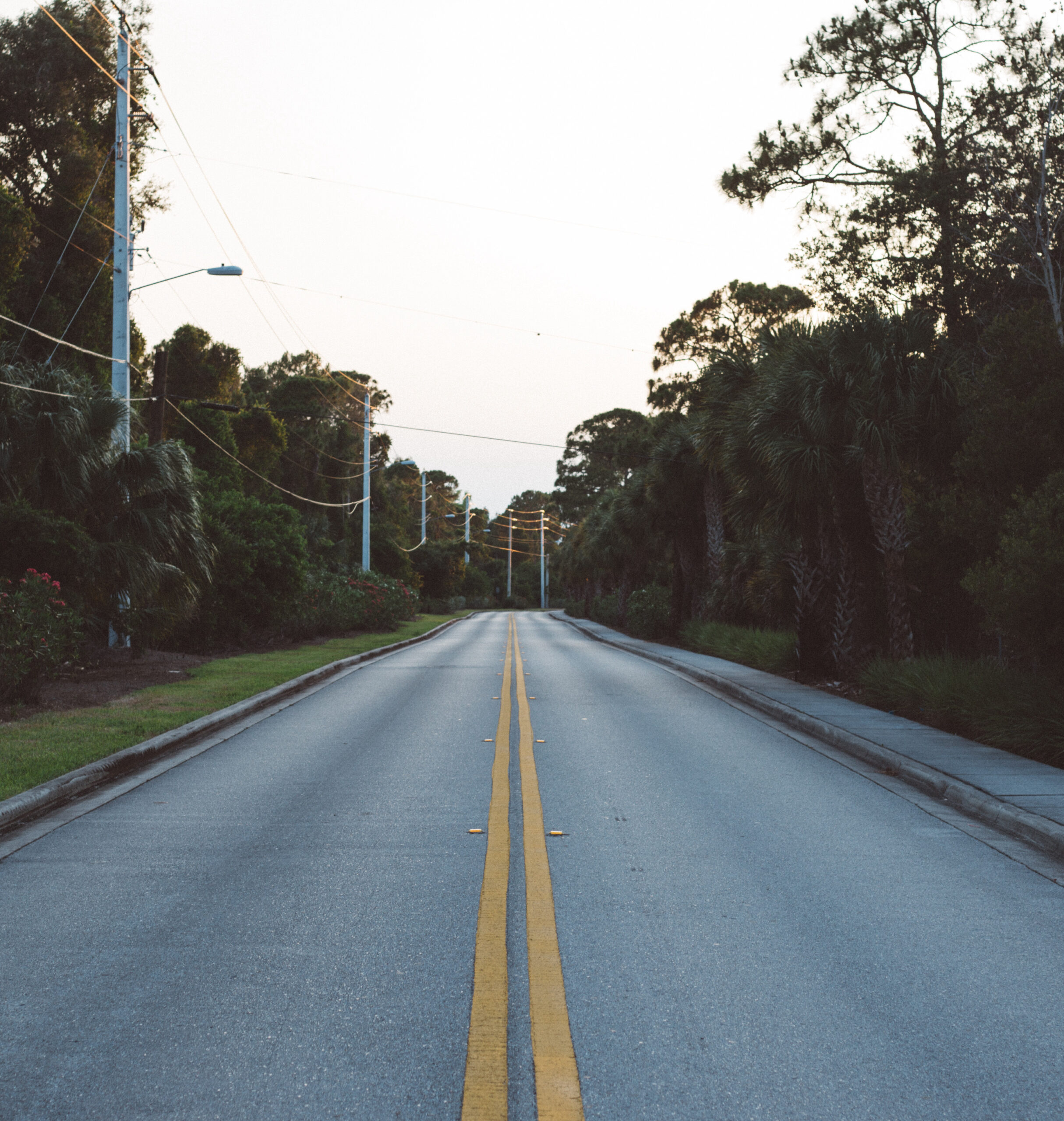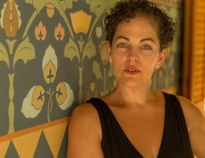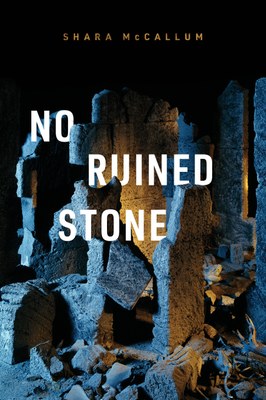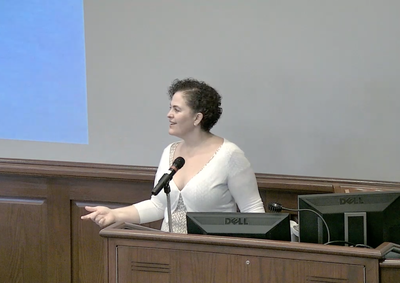Both Poet and Laureate: On the Road with Shara McCallum

 The three-second life of a blinker’s tick-tock, the brief focused silence necessary to heed GPS instructions, and constant throughout, the vrooming hum of engine and passing road—these were the background rhythms of my conversation with Shara McCallum, who spoke to me over the phone as she made her way to Penn State Lehigh Valley for her fifth campus event in a stretch of seven over two weeks. Visiting every campus of the Commonwealth is the ordinary task of the Penn State Laureate, which predictably entails an extraordinary amount of driving. But for McCallum, even as a longtime Pennsylvania resident, the task has proven anything but rote.
The three-second life of a blinker’s tick-tock, the brief focused silence necessary to heed GPS instructions, and constant throughout, the vrooming hum of engine and passing road—these were the background rhythms of my conversation with Shara McCallum, who spoke to me over the phone as she made her way to Penn State Lehigh Valley for her fifth campus event in a stretch of seven over two weeks. Visiting every campus of the Commonwealth is the ordinary task of the Penn State Laureate, which predictably entails an extraordinary amount of driving. But for McCallum, even as a longtime Pennsylvania resident, the task has proven anything but rote.
“I expected to love driving this time of the year, and that’s been true. What I didn’t expect was to find parts of the state, still, that are undiscovered to me,” like the Huntsville Reservoir in the Back Mountain region of Luzerne County. The question of beauty, however, is for McCallum inextricably imbricated with Pennsylvania’s ugly history as “an extraction” state, its land bearing the scars of a settler colonialism that has displaced indigenous populations and leached natural resources for industrial profit. “When I go to a place where I don’t see that [legacy], that is phenomenal.” The glimpse of Back Mountain’s beauty does not stand on its own, but always in addition and relation to the larger historical conditions of Pennsylvania.

- No Ruined Stone was published in August 2021 by Alice James Books. Image: Shara McCallum
Yet this very capability is also the source of poetry’s challenge, which McCallum acknowledges by tailoring her events as Laureate to an audience relatively unfamiliar with, and even intimidated by, poetry. On a practical level, this can mean focusing more on narrative elements of her poems, or altering on the fly which exact poems she will read. But more fundamentally, it means a substantial incorporation of her audience’s engagement. “I have a lot of time for Q and A, deliberately, because I think that that is much more engaging for people. I’m not a scholar; I’m not here to give a one-hour lecture on the history of the eighteenth century.” While confirming “that poetry can reach individuals,” and thus is well-suited to the Laureate’s mission to bring greater visibility to the arts and humanities, McCallum nonetheless emphasizes the need to “meet people where they’re beginning”—not just to expose her audience to poetry, but also to facilitate access points to poetry as an art that will linger long after the event is over.

- Shara kicked off her Laureate year by giving the First-Year Lecture to Liberal Arts students.
“I think that’s a part of the mission of the Laureate position, whether it’s held by a poet or not: to actually remind a lot of students in places where the arts and the humanities are often even more put upon than at University Park, just by virtue of the demographics of the student body, that this is something you can incorporate into your life.”
This effort extends beyond the campus reading events that have so far typified McCallum’s Laureate agenda, which she has tried to diversify to push the boundaries of the role. In the spirit of providing effective access points to poetry, initiatives such as “Poetry Moment,” a weekly WPSU program hosted by McCallum that highlights the work of contemporary Pennsylvania poets, are aimed at providing a platform for poetry beyond the auditorium or classroom walls, and beyond McCallum’s own work. With next semester featuring fewer Commonwealth campus visits, McCallum is looking forward to tapping into the many communities and forums at University Park to foster such opportunities. To give just one example, McCallum hopes to work with Penn State’s College of Education to offer a workshop for high school teachers-in-training focused on curricular strategies for reconceptualizing the educational context in which high school students encounter poetry. “The message that they often get, unfortunately, is, ‘This is not for me, because the poem is a riddle and I don’t know how to solve it.’” To work against this conception of poetry as “calculus,” McCallum says, “we have to think about the people who are actually on the frontlines of working with students.”
But more than a singular event, what McCallum is looking forward to is the “constant” of the Laureate position: the opportunities for “just connecting with individuals.” Consistent with approaching poetry as a form of dwelling, affording “more opportunity to stay inside an experience,” McCallum approaches the Laureate road ahead not as a list of events to hold and check off, but as an experience to stay inside of. Fittingly, her approach exemplifies what the Laureate mission is designed to facilitate, not merely a greater visibility of the humanities but an illumination of its distinctive value. The “larger mission of the liberal arts,” McCallum notes, “is not just to teach a particular vocation but a way of being that will carry you far in your life.”
Shara McCallum’s next stops:
- 11/9: Gettysburg College, Lyceum, Penn Hall, 5pm
- 11/10: Penn State Mont Alto, Library, 12:15pm
- 11/11: University of Miami, Ibis Literary Series, Zoom, 7pm
- 11/16: Penn State Alumni Association, Virtual Speaker Series, Zoom, 12pm
- 11/21: Miami Book Fair International, Room 8503, 2pm
See Shara’s full semester schedule here.

 The three-second life of a blinker’s tick-tock, the brief focused silence necessary to heed GPS instructions, and constant throughout, the vrooming hum of engine and passing road—these were the background rhythms of my conversation with Shara McCallum, who spoke to me over the phone as she made her way to Penn State Lehigh Valley for her fifth campus event in a stretch of seven over two weeks. Visiting every campus of the Commonwealth is the ordinary task of the Penn State Laureate, which predictably entails an extraordinary amount of driving. But for McCallum, even as a longtime Pennsylvania resident, the task has proven anything but rote.
The three-second life of a blinker’s tick-tock, the brief focused silence necessary to heed GPS instructions, and constant throughout, the vrooming hum of engine and passing road—these were the background rhythms of my conversation with Shara McCallum, who spoke to me over the phone as she made her way to Penn State Lehigh Valley for her fifth campus event in a stretch of seven over two weeks. Visiting every campus of the Commonwealth is the ordinary task of the Penn State Laureate, which predictably entails an extraordinary amount of driving. But for McCallum, even as a longtime Pennsylvania resident, the task has proven anything but rote.
“I expected to love driving this time of the year, and that’s been true. What I didn’t expect was to find parts of the state, still, that are undiscovered to me,” like the Huntsville Reservoir in the Back Mountain region of Luzerne County. The question of beauty, however, is for McCallum inextricably imbricated with Pennsylvania’s ugly history as “an extraction” state, its land bearing the scars of a settler colonialism that has displaced indigenous populations and leached natural resources for industrial profit. “When I go to a place where I don’t see that [legacy], that is phenomenal.” The glimpse of Back Mountain’s beauty does not stand on its own, but always in addition and relation to the larger historical conditions of Pennsylvania.

- No Ruined Stone was published in August 2021 by Alice James Books. Image: Shara McCallum
Yet this very capability is also the source of poetry’s challenge, which McCallum acknowledges by tailoring her events as Laureate to an audience relatively unfamiliar with, and even intimidated by, poetry. On a practical level, this can mean focusing more on narrative elements of her poems, or altering on the fly which exact poems she will read. But more fundamentally, it means a substantial incorporation of her audience’s engagement. “I have a lot of time for Q and A, deliberately, because I think that that is much more engaging for people. I’m not a scholar; I’m not here to give a one-hour lecture on the history of the eighteenth century.” While confirming “that poetry can reach individuals,” and thus is well-suited to the Laureate’s mission to bring greater visibility to the arts and humanities, McCallum nonetheless emphasizes the need to “meet people where they’re beginning”—not just to expose her audience to poetry, but also to facilitate access points to poetry as an art that will linger long after the event is over.

- Shara kicked off her Laureate year by giving the First-Year Lecture to Liberal Arts students.
“I think that’s a part of the mission of the Laureate position, whether it’s held by a poet or not: to actually remind a lot of students in places where the arts and the humanities are often even more put upon than at University Park, just by virtue of the demographics of the student body, that this is something you can incorporate into your life.”
This effort extends beyond the campus reading events that have so far typified McCallum’s Laureate agenda, which she has tried to diversify to push the boundaries of the role. In the spirit of providing effective access points to poetry, initiatives such as “Poetry Moment,” a weekly WPSU program hosted by McCallum that highlights the work of contemporary Pennsylvania poets, are aimed at providing a platform for poetry beyond the auditorium or classroom walls, and beyond McCallum’s own work. With next semester featuring fewer Commonwealth campus visits, McCallum is looking forward to tapping into the many communities and forums at University Park to foster such opportunities. To give just one example, McCallum hopes to work with Penn State’s College of Education to offer a workshop for high school teachers-in-training focused on curricular strategies for reconceptualizing the educational context in which high school students encounter poetry. “The message that they often get, unfortunately, is, ‘This is not for me, because the poem is a riddle and I don’t know how to solve it.’” To work against this conception of poetry as “calculus,” McCallum says, “we have to think about the people who are actually on the frontlines of working with students.”
But more than a singular event, what McCallum is looking forward to is the “constant” of the Laureate position: the opportunities for “just connecting with individuals.” Consistent with approaching poetry as a form of dwelling, affording “more opportunity to stay inside an experience,” McCallum approaches the Laureate road ahead not as a list of events to hold and check off, but as an experience to stay inside of. Fittingly, her approach exemplifies what the Laureate mission is designed to facilitate, not merely a greater visibility of the humanities but an illumination of its distinctive value. The “larger mission of the liberal arts,” McCallum notes, “is not just to teach a particular vocation but a way of being that will carry you far in your life.”
Shara McCallum’s next stops:
- 11/9: Gettysburg College, Lyceum, Penn Hall, 5pm
- 11/10: Penn State Mont Alto, Library, 12:15pm
- 11/11: University of Miami, Ibis Literary Series, Zoom, 7pm
- 11/16: Penn State Alumni Association, Virtual Speaker Series, Zoom, 12pm
- 11/21: Miami Book Fair International, Room 8503, 2pm
See Shara’s full semester schedule here.